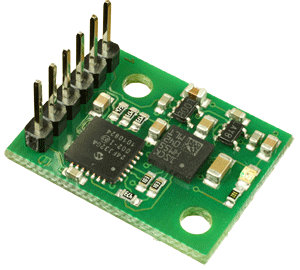Ultra-precise electronic compass and position sensor

I had the task of determining the orientation of the object in space, namely, the creation of an automated drive for the antenna. I very quickly chose the Arduino platform as the basis.
However, the search for an electronic compass and a tilt angle sensor took longer. I knew that high-precision sensors cost hundreds of dollars, but in the end, the latest (appearance April 2011) sensor with fantastic properties was found. The CMPS10 device for just £ 20 promises a compass measurement accuracy in an azimuth of 0.5% and in an elevation angle of 1% with a resolution of 0.1 degrees.
')
This accuracy is sufficient, for example, for pointing a satellite dish 1.5 meters in size.
Unfortunately, shipping to Russia from an online store is 15 pounds, i.e. almost equal to the cost of the sensor. Therefore, I am looking for like-minded people from Moscow to jointly purchase and, more importantly, write a driver for this sensor for the Arduino platform and further exchange of experience. Write in the comments and personal mail.
By virtue of the customs rules of the Russian Federation in one parcel there should not be more than 5 units of goods.
Module Features:
- Voltage - 3.3 or 5 volts
- Consumed then - 25 mA
- Resolution - 0.1 degrees
- Horizontal accuracy - 0.5%
- Tilt accuracy - movement ± 60 degrees, 1%
- Output 1 - I2C Interface, SMBUS compatible, 0-255 and 0-3599, 100khz
- Output 2 - Serial port, 9600 baud, no parity, 2 stop bits and 3.3v-5v signal levels
- Output 3 - Timing Pulse 1mS to 37mS in 0.1mS increments
- Miniature size - 24mm x 18mm
The board contains 2 sensors and an embedded 16-bit signal processor.
Sensor streams are available:
- Acceleration (Acceleration)
- Magnetic Field (Magnitude)
The built-in DSP calculates 3 angular displacements:
- Pitch
- Roll (Roll)
- Direction of the compass to determine Yaw (Yaw)
Read more in wikipedia: ru.wikipedia.org/wiki/Rotation
Small Update for those interested.
On sparkfun devices of the previous generation are available. Their cost is $ 150 and accuracy is 3-4 degrees. In industrial systems that are manufactured and operated, a set of high-precision sensors costs $ 500.
The new device in its characteristics at a price of $ 30 can make a revolutionary leap. Or maybe not commit. While I study Arduino, someone can already study the sensor. If the work with the sensor is as simple as two bytes over i2c, then this will be a revolution. However, I am afraid that working with solid-state sensors is an order of magnitude more complex mathematical and even scientific task, an example of the description is on the Habré . Therefore, it is important to attract enthusiasts.
Source: https://habr.com/ru/post/120078/
All Articles